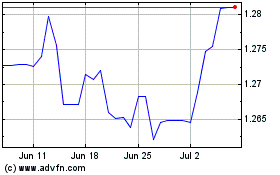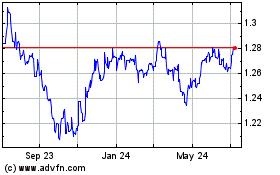Pound Falls As BoE Governor Bailey Hints At Aggressive Rate Cuts
October 03 2024 - 2:30AM
RTTF2
The British pound weakened against other major currencies in the
European session on Thursday, after Bank of England Governor Andrew
Bailey reportedly hinted at 'more aggressive' path for cutting
interest rates if inflation news stays positive.
In a wide-ranging interview with the Guardian, Bailey held out
the prospect of the Bank becoming a "bit more aggressive" with
interest-rate cuts.
Mr. Bailey added that the monetary policy committee was also
closely watching developments in the Middle East amid fears of a
fresh oil price shock.
He said, "Geopolitical concerns are very serious. From the point
of view of monetary policy, it's a big help we haven't had to deal
with a big increase in the oil price.
European stocks traded lower, as investors weigh Middle East
risks and await key U.S. data for additional clues on the Fed's
rate trajectory.
Investors remain concerned about the prospects of a wider Middle
East war, with Israel's war cabinet reportedly weighing its
response after Iran launched its largest-ever attack on the country
in an escalation of hostilities.
Multiple airstrikes were reported in Beirut earlier today with
explosions heard in the Lebanese capital. Authorities said at least
six people were killed.
Amid West Asia conflict escalation, several countries have
issued advisories, and some have evacuated their citizens.
In economic releases, trading later in the day may be impacted
by reaction to the latest U.S. economic data, including reports on
weekly jobless claims, service sector activity and factory
orders.
Meanwhile, final survey data from S&P Global showed that the
U.K. service sector activity continued to expand in September amid
rising domestic demand, though the pace of growth eased since
August. The S&P Global Services Purchasing Managers' Index
dropped to 52.4 in September from 53.7 in the previous month. The
flash score was 52.8.
In the European trading now, the pound fell to a 2-week low of
0.8422 against the euro, from an early high of 0.8324. On the
downside, 0.85 is seen as the next support level for the pound.
Data compiled by S&P Global showed that the euro area
private sector shrank for the first time in seven months in
September as Germany, France and Italy recorded contractions
simultaneously for the first time in 2024 so far. The final HCOB
composite output index fell to 49.6 in September from a three-month
high of 51.0 in August. The flash score was 48.9.
The final services Purchasing Managers' Index slid less than
initially estimated to 51.4 from 52.9 in the prior month. The flash
score was 50.5.
Against the U.S. dollar and the Swiss franc, the pound slid to
3-week lows of 1.3106 and 1.1154 from early highs of 1.3265 and
1.1284, respectively. If the pound extends its downtrend, it is
likely to find support around 1.30 against the greenback and 1.10
against the franc.
The pound edged down to 192.24 against the yen, from an early
6-day high of 195.18. The pound may test support near 185.00
region.
In economic news, the services sector in Japan continued to
expand in September, albeit at a slower pace, the latest survey
from Jibun Bank revealed on Thursday with a services PMI score of
53.1. That's down from 53.7 in August, although it remains above
the boom-or-bust line of 50 that separates expansion from
contraction. The data also said the composite PMI slipped to 52.0
in September from 52.9 in August.
Japan's newly appointed Prime Minister Shigeru Ishiba said that
the nation is not prepared for additional rate hikes, following a
meeting with the central bank governor.
Looking ahead, U.S. weekly jobless claims, Canada and U.S. PMI
reports for September and U.S. factory orders for August are set to
be released in the New York session.
Sterling vs US Dollar (FX:GBPUSD)
Forex Chart
From Oct 2024 to Nov 2024

Sterling vs US Dollar (FX:GBPUSD)
Forex Chart
From Nov 2023 to Nov 2024
